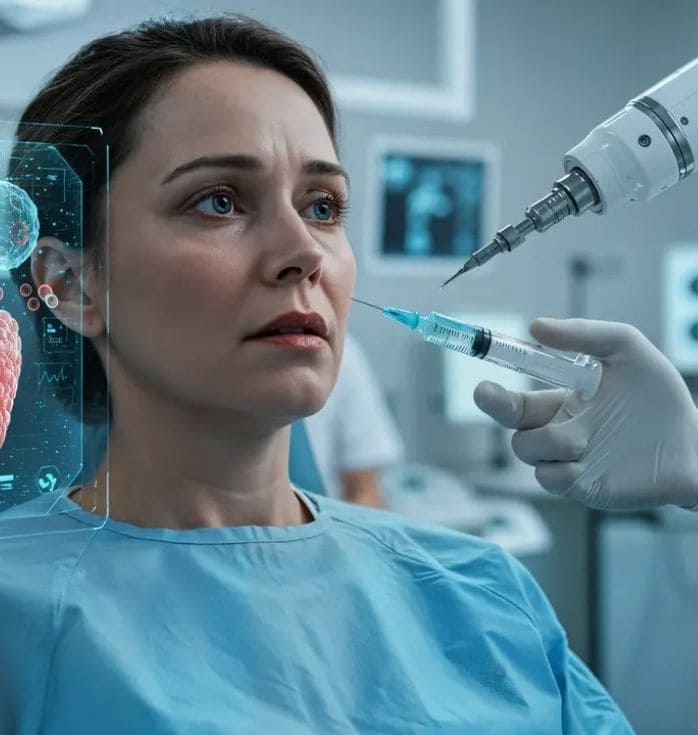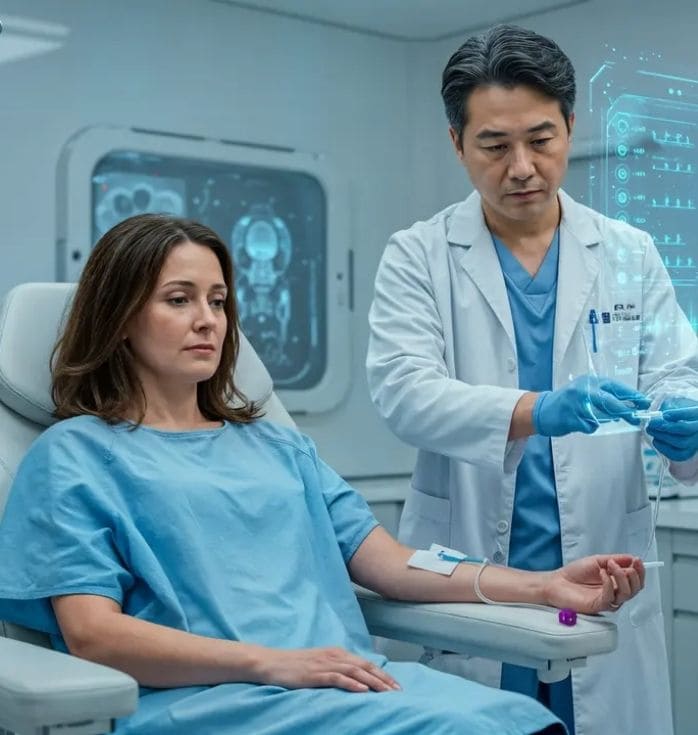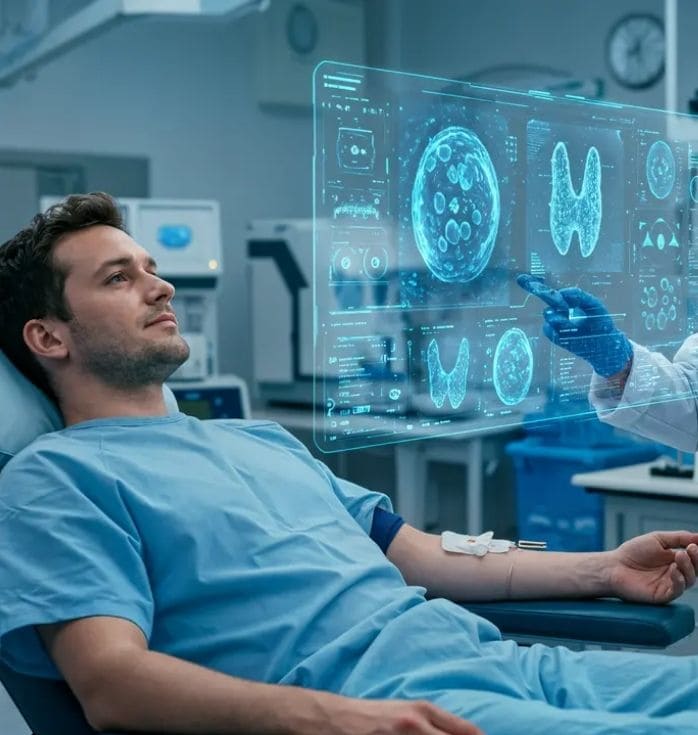

Stem cell treatment for Hashimoto’s disease shows remarkable promise, with 90% of patients reporting positive results and zero serious adverse events. Regencord, a leading regenerative medicine center, has treated more than 5,376 patients worldwide in the last decade. The United States represents 70% of their patient base.
Recent research reveals promising developments in stem cell therapy for Hashimoto’s disease, despite its experimental stage. Mesenchymal stem cells know how to modulate immune responses and regenerate thyroid cells. These capabilities bring new hope to patients looking for alternatives beyond conventional Hashimoto’s thyroiditis treatments. Regencord’s advanced therapies follow strict safety protocols and hold international certifications including ISO 9001, ISO 13022, and ISO 22859.
This detailed piece explains stem cell therapy's effectiveness for Hashimoto's disease. Readers will learn what to expect during treatment at Regencord Pereira and discover the latest research on new treatments for Hashimoto's thyroiditis supporting this innovative approach to autoimmune thyroid conditions.


Hashimoto’s thyroiditis affects up to 10% of the population, especially women. This condition stands as the most common cause of hypothyroidism in areas with sufficient iodine. Patients face complex challenges when they look beyond standard hormone replacement therapy to treat this chronic autoimmune condition. Many wonder, “Can Hashimoto’s be cured?” While a definitive cure remains elusive, new treatments for Hashimoto’s thyroiditis in 2023 offer hope for better management and potential remission.
In Hashimoto’s thyroiditis, an autoimmune disorder, the body’s immune system attacks its own thyroid gland. The immune system creates antibodies that target thyroid tissue, mainly thyroid peroxidase antibodies (TPOAb) and thyroglobulin antibodies (TGAb). These antibodies show up in about 80-90% of patients who have autoimmune thyroid diseases.
This immune attack sets off inflammation where lymphocytes, especially T cells, infiltrate the thyroid gland. The inflammation damages the thyroid through progressive fibrosis, destroys follicles, and leads to tissue atrophy. The damaged thyroid can't produce enough essential thyroid hormones—thyroxine (T4) and triiodothyronine (T3)—that control the body's metabolism.
Thyroid destruction happens slowly. Patients usually take about 10 years from their original autoimmune attack to get a formal diagnosis. During this time, they might experience:
Doctors typically prescribe thyroid hormone replacement therapy to treat Hashimoto-induced hypothyroidism. Patients take synthetic levothyroxine daily at doses of 1.5-1.7 μg per kg of body weight. This Hashimoto thyroiditis medication helps manage hypothyroidism but doesn't deal very well with the autoimmune process.
Traditional medical treatment focuses on bringing thyroid hormone levels back to normal instead of stopping or reversing the autoimmune attack. Patients must take medication for life because stopping would bring their symptoms back. Hormone replacement fixes the deficiency but can't stop the thyroid gland's ongoing destruction or prevent other autoimmune diseases from developing.
Some treatments, such as selenium supplements, vitamin D correction, and certain herbal medicines, help manage Hashimoto's thyroiditis. However, these approaches have limited success against the autoimmune mechanism that drives the disease. This limitation has led researchers to explore new treatments for hypothyroidism that address the root cause of Hashimoto's.
Scientists now tap into the potential of regenerative medicine—specifically stem cell therapy. This approach might treat the autoimmune aspect of Hashimoto's rather than just manage symptoms. Many patients and researchers are asking, "Is there a cure for Hashimoto's disease?" While stem cell therapy isn't yet a definitive cure, it represents one of the most promising new treatments for Hashimoto's thyroiditis.
Mesenchymal stem cells (MSCs) show real promise to treat Hashimoto's. These cells know how to regulate immune responses that go wrong in autoimmune conditions. Doctors can harvest MSCs from human adipose tissue, umbilical cord tissue, or bone marrow. Some researchers are also exploring the potential of induced pluripotent stem cells and embryonic stem cells for thyroid regeneration.
Animal studies reveal impressive therapeutic effects from MSC transplantation. For instance, rats with induced Hashimoto's thyroiditis who received MSCs had fewer thyroid lesions, less lymphoid infiltration, and lower thyroid autoantibody levels compared to untreated subjects. The treatment works by changing T helper cells, especially the Th17/Treg cell balance which plays a vital role in autoimmune responses.
MSCs might help rebuild thyroid tissue too. Research shows these versatile cells can become functional thyroid follicular cells and help repair damaged tissue. This unique ability to regenerate, combined with immune system regulation, makes stem cell therapy a promising solution to address both symptoms and why Hashimoto's disease happens.

Medical breakthroughs in regenerative medicine have created exciting possibilities for patients with autoimmune thyroid conditions. Stem cell treatment for Hashimoto’s disease is one of the most promising new approaches. Scientists now look beyond just managing symptoms and aim to tackle why it happens in the first place.
Scientists have broken down several types of stem cells that could help treat autoimmune thyroid conditions. Each type has unique features and possible uses:
MSCs stand out as the best option to treat thyroid issues because they're both safe and effective. Mount Sinai researchers showed great results by creating pure, working human thyroid cells from skin cells. These cells can make thyroid hormone, which opens doors to personalized thyroid treatment.
MSCs are remarkable healers of damaged thyroid tissue. These cells naturally find their way to injured areas of the thyroid gland. Once they arrive, they start their repair work.
MSCs help rebuild the thyroid in three main ways. They can become working thyroid follicular cells to replace damaged ones. They release growth factors and proteins that help tissue heal itself. They also wake up adult thyroid stem cells that already live in the gland.
Research with special glowing bone marrow cells showed that MSCs help rebuild damaged thyroid glands. Scientists found these glowing cells making thyroglobulin in thyroid follicles. This proves MSCs directly help fix damaged tissue, offering hope for those wondering if Hashimoto's disease is curable.
MSCs excel at fixing the overactive immune response in Hashimoto's disease. They target the root cause by stopping the immune system's attack on thyroid tissue.
These cells balance important immune cell interactions, especially between Th17 and Treg cells. Lab rats with Hashimoto's showed substantially lower thyroid antibodies after MSC treatment. Their thyroids had less damage, fewer inflammatory cells, lower levels of harmful Th17 cells, and more helpful regulatory T cells.
MSCs also change how macrophages work in thyroid tissue. They reduce harmful M1 macrophages by lowering IRE1α levels and adjusting the STING pathway - a vital part of controlling inflammation. These cells also cut down inflammatory proteins and help restore the balance between Th1 and Th2 responses.
Fat-derived MSCs from humans work especially well in lab tests. After treatment, mice with thyroid problems showed less inflammation and better immune responses. MSCs from human amniotic tissue helped older mice with mild thyroid problems by protecting thyroid cells from dying.
This powerful effect on the immune system makes stem cell therapy a promising way to treat both symptoms and the core issues of Hashimoto's disease. While it's too early to claim stem cells as a definitive Hashimoto's thyroiditis cure, the anti-inflammatory and regenerative properties of these cells offer significant potential for managing the condition.
Regencord Pereira's innovative approach to Hashimoto's treatment combines state-of-the-art facilities, custom protocols, and expert medical supervision. Regencord's detailed approach builds on more than a decade of experience. The center has successfully treated over 5,376 patients worldwide.
Regencord's sterile laboratories use specialized technology that meets the highest international quality standards. The center's excellence shows through multiple ISO certifications:
Regencord's quality certificates let patients track specific tests done on their cells. This careful attention to detail will give both safety and effectiveness in treating autoimmune conditions like Hashimoto's thyroiditis.
Most treatments only deal with symptoms. Regencord's protocols target why the autoimmune mechanism drives Hashimoto's disease. Each patient gets a custom treatment plan after a thorough evaluation of their condition.
The center uses mesenchymal stem cells (MSCs) to treat Hashimoto's. These cells have shown great results in reducing thyroid lesions and lymphoid infiltration by adjusting the Th17/Treg cell balance. This approach helps lower thyroid autoantibodies, restore normal thyroid size, and reduce inflammation. Patients might even need less Hashimoto's thyroiditis medication.
Regencord's team provides specialist, professional, and caring medical advice. They guide patients from their first consultation through their follow-up care, always staying updated on the latest research on Hashimoto's thyroiditis.
Regencord's medical staff has specialists in genetics, pharmacology, biology, biotechnology, and bacteriology. The core team leading these innovative treatments consists of two key experts:
Their diverse team applies the newest research on Hashimoto's thyroiditis. They develop treatments that go beyond managing symptoms and work toward reversing the autoimmune process itself. While they can't yet guarantee a complete Hashimoto cure, their approach represents some of the most advanced Hashimoto disease treatments available.


The journey toward healing starts with a complete pre-treatment evaluation at Regencord Pereira. Each patient’s stem cell protocol for Hashimoto’s thyroiditis is customized based on their unique condition.
Patients undergo a full clinical evaluation that includes laboratory testing and additional diagnostic procedures. A specialized epigenetic test gives doctors vital information about biological versus chronological age, helping them tailor the treatment approach. After receiving medical records, a dedicated Patient Advisor helps with travel arrangements to the facility. This all-encompassing approach determines who qualifies and what therapeutic strategy will work best for each person’s autoimmune condition.
Physicians administer mesenchymal stem cells on treatment day through different routes—intravenous, intra-arterial, or intranasal—based on what each patient needs. The stem cell dosage varies from 1 to 8 million cells, adjusted according to how severe Hashimoto's disease is. The medical team keeps a close watch on patients throughout this process to ensure they're comfortable and safe.
Patients then receive three sessions in hyperbaric chambers that serve multiple beneficial purposes:
Regencord provides transportation from the treatment center once the procedure is complete. Doctors evaluate progress at specific intervals—30, 60, and 90 days after treatment—to check improvements, flare-up frequency, and contracture release. A more detailed evaluation happens at the six-month mark with laboratory testing, clinical assessment, and quality of life measures.
Patients might notice subtle changes as stem cells begin their immunomodulatory work. The main mechanism balances the Th17/Treg cell interactions, which calms the autoimmune response. Most patients see a gradual improvement in thyroid function over several months.
Clinical observations indicate that stem cell therapy could temporarily slow or completely stop autoimmune processes. It may restore damaged thyroid cells and, in some cases, normalize hormone production enough to reduce medication needs. Notwithstanding that, each patient's response timeline depends on their disease severity, overall health status, and individual biological factors.
Stem cell treatment for Hashimoto's disease shows promising results, though scientists continue to gather conclusive evidence through clinical studies. Scientists need to analyze clinical data, patient experiences, and current limitations to determine its effectiveness.
Early-phase clinical trials of mesenchymal stem cells (MSCs) for Hashimoto's disease reveal encouraging preliminary outcomes. Scientists used animal models of autoimmune thyroiditis where stem cell transplantation reduced thyroid inflammation, promoted tissue regeneration, and restored hormone production. These studies showed that MSCs specifically decrease thyroid lesions and lymphoid infiltration through modulation of the Th17/Treg cell balance.
Several key areas showed measurable clinical improvements:
Scientists emphasize that stem cell therapy for thyroid conditions remains experimental. Larger clinical trials are needed to determine definitive efficacy and answer the question, "Is Hashimoto's disease curable?"
Some patients decreased their reliance on hormone replacement therapy. Current evidence suggests that stem cell therapy improves thyroid function rather than completely curing Hashimoto's disease. Patients who received treatment very early in the disease process reported complete resolution.
The therapy has potential risks including infection, immune rejection, tumor formation, and high costs ($5,000-$50,000 without insurance coverage). Patients might need multiple treatments to maintain benefits. Note that stem cell therapy for Hashimoto's lacks FDA approval and isn't accessible to more people.
Stem cell therapy for Hashimoto's thyroiditis offers new hope but needs validation through larger controlled studies before becoming a mainstream treatment option. While it's not yet a definitive cure for Hashimoto's thyroiditis, it represents one of the most promising new treatments for hypothyroidism and autoimmune thyroid diseases.
Stem cell treatment for Hashimoto’s disease marks a breakthrough in autoimmune thyroid care. Clinical evidence and patient experiences show real improvements in thyroid function, reduced inflammation, and lower medication needs. Regencord’s track record with over 5,376 patients worldwide proves their approach to customized stem cell protocols works.
Studies support the dual benefits of mesenchymal stem cells: They calm overactive immune responses and promote thyroid tissue regeneration. These qualities make stem cell therapy valuable, especially when patients are looking beyond standard hormone replacement.
Medical science now stands at a promising threshold for Hashimoto’s treatment. While stem cell therapy might not completely cure Hashimoto’s disease, patient outcomes show it could become a key part of detailed thyroid care. As research progresses, we may get closer to answering the question, “Can Hashimoto’s be cured?” For now, stem cell therapy offers hope as one of the most innovative new treatments for Hashimoto’s thyroiditis.
Patients should review their options and stay updated about new developments in this faster-growing field. While conventional Hashimoto’s thyroiditis medication remains important, stem cell therapy and other emerging treatments may offer additional benefits for managing this complex autoimmune condition.
Discover how stem cell therapy can help you manage Hashimoto’s disease. Contact Regencord for a personalized consultation and explore cutting-edge treatment options designed for your needs.
3-Step Process for Stem Cell Treatment for Arthritis in Hands
Stem cells are unique cells with the ability to develop into various cell types and repair damaged tissues. They are used in regenerative medicine, including treatments for cancer, neurodegenerative diseases, and injuries. Sources include bone marrow, cord blood, and embryos.
+1 888-540-4101


